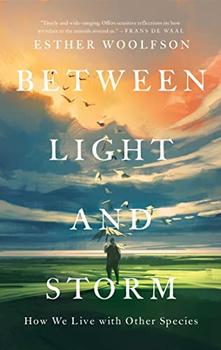Summary | Excerpt | Reviews | Beyond the Book | Readalikes | Genres & Themes | Author Bio

How We Live with Other Species
by Esther Woolfson
she experiences them, I don't know and never will.
Left alone amid the lights, phones, voices from the radio, all the crowded, overlapping spheres in which we're all obliged to find our uneasy way, I still move cautiously. If I had killed the spider accidentally, I'd have felt bereft, even if it would have been a brief bereavement. I've probably trodden unknowingly on dozens of similar creatures today.
Once, I wouldn't have thought very much about spiders or any other creatures or considered that they might be less than a human being. I loved and thought about the family pets I had as a child whose lives were close to mine but I wouldn't have asked myself why, or even if we were different, apart from in purely morphological ways. I never believed that humans occupy a higher position on any scale of life on earth than every other living being but if I had once considered the possibility, I probably would not have recognized the idea as part of an enduring inheritance of a particular culture and system of thought that has directed the attitude many humans hold towards everyone else who lives.
For the past three thousand or so years, we have nurtured a set of beliefs as unchanged as an insect waving immobile from its cage of amber, like some lostcause corpse hovering in cryonic vitrification. These ideas have underpinned our behaviour, encouraged and allowed every deed and action in and towards the natural world. Over the vast territory, physical, temporal, cultural and intellectual, included in the term 'Western', we've clutched to ourselves with a rare and fervid assiduity a system of beliefs known as the Scala Naturae, or 'great Chain of Being'. They derived from a fusion of biblical ideas, those of ancient greek philosophers and later Christian theologians who assured us – speaking as they did with the highest divine authority – that being human in itself gave us ascendancy over every other species and that whatever we did to, or required of them, as individuals or entire species was justified because they were put on earth specifically for our benefit. not only were we humans made in the image of god, we were the sole species given dominion over everyone else on earth, the only ones with souls.
If the astonishingly brilliant, inventive and thoughtful mind of Aristotle provided a 'scientific' basis for a belief in a hierarchic scale of values of life on earth, it was the dazzling drama of genesis which provided the background and explanation for it in a story that would entrance with its complex, illustrative beauty: the creation of a universe summoned, lit and populated within the seven days of its sequential, metaphoric cadences. The ideas engendered were to dominate half the world, as if, throughout history, almost every philosopher, savant or divine of any stature in Western thinking conspired against the interests of the rest of existing, breathing creation.
I might never have thought about any of this if I hadn't been impelled to by the random occurrences that dictate all our lives, the misfortune that causes birds to fall from trees, to become injured, abandoned, lost. At the beginning, when I first came by these birds, I knew very little about them but not knowing what else to do my family and I took them in. The feeding, care and housing of creatures acquired by accident or serendipity was simple enough and involved little more than consulting books and doing what seemed appropriate. nothing told me that with these apparently chance acquisitions, I'd be challenged in every assumption I might have had about the lives and abilities of both humans and other creatures. If I had been concerned about my relative position on the branches of the Tree of Life, anxious to retain my privilege one tier below god and angels, I'd have felt the first swaying and tilting as the tree was blown by a mighty, excoriating wind. If I had ever believed humans to be the only ones to live pro found and interconnected lives, I couldn't any more.
Excerpted from Between Light and Storm by Esther Woolfson. Copyright © 2022 by Esther Woolfson. Excerpted by permission of Pegasus Books. All rights reserved. No part of this excerpt may be reproduced or reprinted without permission in writing from the publisher.
Your guide toexceptional books
BookBrowse seeks out and recommends the best in contemporary fiction and nonfiction—books that not only engage and entertain but also deepen our understanding of ourselves and the world around us.